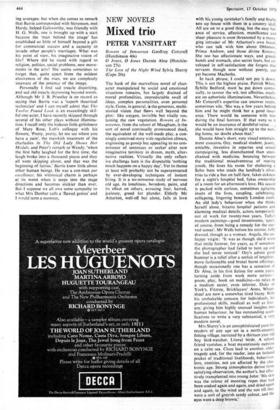NEW NOVELS
Mixed trio
PETER V.ANSITTART
Bowers of Innocence Geoffrey Cotterell (Hutchinson 40s) 0 Jones, 0 Jones Dannie Abse (Hutchin- son 27s) The Loss of the Night Wind Sylvia Sherry (Cape 20s)
The husk of the marvellous novel of char- acter manipulated by social and emotional situations remains, but largely drained of moral profundities, unpredictable swell of ideas, complex personalities, .even personal style. Gone, in general, is the generous, multi, storied vision that flows well beyond the plot: like oxygen, invisible but vitally sus. taining the raw vegetation. Bowers of In- nocence, from the school of Maugham, is the sort of novel continually pronounced dead, the equivalent of the well-made play, a cun- ningly contrived story with regulation climax, engrossing as gossip but appealing to no con- noisseur of sentences or seeker after new imaginative territory in dream, myth, alter. native realities. Virtually the only reflect- ive challenge here is the disputable 'nothing much happens on a happy day'. Yet its theme at least will probably not be superannuated by ever-developing techniques of instant living. It is a no-nonsense study of nervous old age, its loneliness, boredom, pains, and its effect on others, arousing fear, hatred, jealousy, greed for plunder. Elderly Mr Atherton, well-off but alone, falls in love
with his young caretaker's family and finally sets up house with them in a country idyll. All are on to a good thing, but the easy bal- ance of service, affection, munificence and sheer pleasure is soon threatened by a mana- ging intruder of Mr Atherton's own breed, who can talk with him about Oblomov,
Prince Andrew, and those divine Rostovs. She too has affectionate ways, and greedy
hands and stomach, also secret fears, but en- veloped in self-satisfaction she forgets that servants though now without poetry, can yet become Macbeths.
In hack phrase, I could not put it down. This is not the highest praise. Patrick White, Sybille Bedford, must be put down contin- ually, to savour the wit, test affinities, medit- ate on aphoristic illuminations. Nevertheless, Mr Cotterell's expertise can uncover truths. sometimes vile. 'She was a few years behind him and he might think her a good insur- ance. There would be someone with him during the final horrors. If that were so it would be an insurance of doubtful value she would have him straight up to the nurs. ing home, no doubt about that.'
Dannie Abse's short, very visual entertain- ment concerns Ozy, medical student, jaunty.
amiable, inventive in repartee and sexual campaigning, less disenchanted than unen- chanted with medicine, bouncing between the traditional misadventures of roaring youth. 'He loses his room for sheltering a Soho bum who steals the landlady's silver, tries to ride a bus on half-fare, fakes sickness for a night's hospital bed, fakes ownership of 'a room for an afternoon's love. His season is packed with curious, sometimes agitating insets of the lives, coupling, celebrating, collapsing, lingering beneath London roofs.
An old lady's behaviour when she thinks herself alone, bizarre hospital patients and alarming medical details, actors temporarily out of work for twenty-two years, Taffy's modern paintings—good investments, 'apart, of course, from being a remedy for the star- ved senses'. Mr Wells before his mirror, fully dressed, though as a woman. Angela, the un- happy virgin: 'It was as thoUgh she'd worn that smile forever, for years, as if somehow the photographer had failed to turn up and she had never noticed.' Ozy's adroit good humour is a relief after a surfeit of lengthier, more fashionable and brutal burnt offerings. though occasionally one has a sensation of Dr Abse, in his first fiction for some years, turning aside from work more serious— poem, play, book on medicine—to relax in a medium easier, even inferior. Duke of York's, Fitzroy, Bricklayers' Arms, Wheat- sheaf are now a somewhat tired litany. With his unshakable concern for individuals, his professional skills, medical as well as liter- ary, giving him highly unusual insights into human behaviour, he has outstanding quali- fications to write a very substantial, a very modern novel.
Mrs Sherry's is an unsophisticated yarn for readers of any age set in a north-country fishing village, narrated by a thirteen year old boy bird-watcher. Literal birds. A school friend vanishes, a boat mysteriously capsizes on a calm sea. Clues lead to another, older tragedy and, for the reader, into an isolated pocket of traditional livelihoods, behaviour. lore, enmities, not yet affected by the elec- tronic age. Strong atmospherics derive from satisfying observation, the author's, but effec- tively transplanted into young John: 'His skin was the colour of mooring ropes that had been soaked again and again, and dried again and again, in the wind and the sun till they were a sort of greyish sandy colour, and the eyes were a deep brown.'






































 Previous page
Previous page